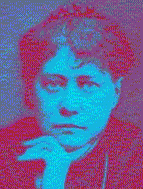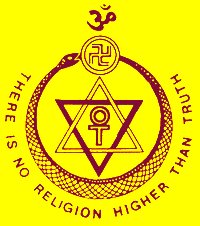The Key to Theosophy

Helena
Petrovna Blavatsky
1831
-1891
_______________________
The Key to Theosophy
By
Helena Petrovna Blavatsky
Theosophy and Asceticism
Q. I have heard people say that your rules require all members to
be
vegetarians, celibates, and rigid ascetics; but you have not told
me anything of
the sort yet. Can you tell me the truth once for all about this?
A. The truth is that our rules require nothing of the kind. The
Theosophical
Society does not even expect, far less require of any of its
members that they
should be ascetics in any way, except-if you call
thatasceticism-that they
should try and benefit other people and be unselfish in their own
lives.
Q. But still many of your members are strict vegetarians, and
openly avow their
intention of remaining unmarried. This, too, is most often the case
with those
who take a prominent part in connection with the work of your
Society.
A. That is only natural, because most of our really earnest workers
are members
of the Inner Section of the Society, which I told you about before.
Q. Oh! Then you do require ascetic practices in that Inner Section?
A. No; we do not requireor enjoin them even there; but I see that I
had better
give you an explanation of our views on the subject of asceticism
in general,
and then you will understand about vegetarianism and so on.
Q. Please proceed.
A. As I have already told you, most people who become really
earnest students of Theosophy, and active workers in our Society, wish to do
more than study
theoretically the truths we teach. They wish to know the truth by
their own
direct personal experience, and to study Occultism with the object
of acquiring
the wisdom and power, which they feel that they need in order to
help others,
effectually and judiciously, instead of blindly and at haphazard.
Therefore,
sooner or later, they join the Inner Section.
Q. But you said that "ascetic practices" are not
obligatory even in that Inner
Section?
A. No more they are; but the first thing which the members learn
there is a true
conception of the relation of the body, or physical sheath, to the
inner, the
true man. The relation and mutual interaction between these two
aspects of human nature are explained and demonstrated to them, so that they
soon become imbued with the supreme importance of the inner man over the outer
case or body.
They are taught that blind unintelligent asceticism is mere folly;
that such conduct as that of St. Labro which I spoke of before, or that of the
Indian Fakirs and jungle ascetics, who cut, burn, and macerate their bodies in
the most cruel and horrible manner, is simply self-torture for selfish ends,
i.e., to develop
will-power, but is perfectly useless for the purpose of assisting
true
spiritual, or Theosophic, development.
Q. I see, you regard onlymoral asceticism as necessary. It is as a
means to an
end, that end being the perfect equilibrium of the inner nature of
man, and the
attainment of complete mastery over the body with all its passions
and desires?
A. Just so. But these means must be used intelligently and wisely,
not blindly
and foolishly; like an athlete who is training and preparing for a
great
contest, not like the miser who starves himself into illness that
he may gratify
his passion for gold.
Q. I understand now your general idea; but let us see how you apply
it in
practice. How about vegetarianism, for instance?
A. One of the great German scientists has shown that every kind of
animal
tissue, however you may cook it, still retains certain marked
characteristics of
the animal which it belonged to, which characteristics can be
recognized. And
apart from that, everyone knows by the taste what meat he is
eating. We go a
step farther, and prove that when the flesh of animals is
assimilated by man as
food, it imparts to him, physiologically, some of the
characteristics of the
animal it came from. Moreover, occult science teaches and proves
this to its
students by ocular demonstration, showing also that this
"coarsening" or
"animalizing" effect on man is greatest from the flesh of
the larger animals,
less for birds, still less for fish and other cold-blooded animals,
and least of
all when he eats only vegetables.
Q. Then he had better not eat at all?
A. If he could live without eating, of course it would. But as the
matter
stands, he must eat to live, and so we advise really earnest students
to eat
such food as will least clog and weight their brains and bodies,
and will have
the smallest effect in hampering and retarding the development of
their
intuition, their inner faculties, and powers.
Q. Then you do not adopt all the arguments which vegetarians in
general are in
the habit of using?
A. Certainly not. Some of their arguments are very weak, and often
based on
assumptions which are quite false. But, on the other hand, many of
the things
they say are quite true. For instance, we believe that much
disease, and
especially the great predisposition to disease which is becoming so
marked a
feature in our time, is very largely due to the eating of meat, and
especially
of tinned meats. But it would take too long to go thoroughly into
this question
of vegetarianism on its merits; so please pass onto something else.
Q. One question more. What are your members of the Inner Section to
do with
regard to their food when they are ill?
A. Follow the best practical advice they can get, of course. Don't
you grasp yet
that we never impose any hard-and-fast obligations in this respect?
Remember
once for all that in all such questions we take a rational, and
never a
fanatical, view of things. If from illness or long habit a man
cannot go without
meat, why, by all means let him eat it. It is no crime; it will
only retard his
progress a little; for after all is said and done, the purely
bodily actions and
functions are of far less importance than what a man thinks and
feels,what
desires he encourages in his mind, and allows to take root and grow
there.
Q. Then with regard to the use of wine and spirits, I suppose you
do not advise
people to drink them?
A. They are worse for his moral and spiritual growth than meat, for
alcohol in
all its forms has a direct, marked, and very deleterious influence
on man's
psychic condition. Wine and spirit drinking is only less
destructive to the
development of the inner powers, than the habitual use of hashish,
opium, and
similar drugs.
__________________________

Find answers to more questions
with these Theosophy links
Dave’s
Streetwise Theosophy Boards
The Theosophy Website that
Welcomes Absolute Beginners
If you run a Theosophy Study Group,
please feel free
to make use of the material on this
Website
The Most Basic Theosophy
Website in the Universe
A quick overview of Theosophy
and the Theosophical Society
If you run a Theosophy Study Group you
can use this as an introductory handout.

Cardiff Theosophical Society meetings
are informal
and there’s always a cup of tea afterwards
The
Cardiff Theosophical Society Website
The
National Wales Theosophy Website
This is for
everybody not just people in Wales
Theosophy Cardiff’s Instant Guide
General pages
about Wales, Welsh History
and The History
of Theosophy in Wales
Independent Theosophy Blog
One liners and quick explanations
About aspects of Theosophy
H P Blavatsky is usually the only
Theosophist that most people have
ever
heard of. Let’s put that right
Lentil burgers, a
thousand press ups before breakfast and
the daily 25 mile
run may put it off for a while but death
seems to get most
of us in the end. We are pleased to
present for your
consideration, a definitive work on the
subject by a
Student of Katherine Tingley entitled
An
Independent Theosophical Republic
Links to Free Online Theosophy
Study Resources; Courses, Writings,
No
Aardvarks were harmed in the
The Spiritual Home of Urban Theosophy
The Earth Base for Evolutionary Theosophy
Classic Introductory
Theosophy Text
A Text Book of Theosophy By C
What Theosophy Is From the Absolute to Man
The Formation of a Solar System The Evolution of Life
The Constitution of Man After Death Reincarnation
The Purpose of Life The Planetary Chains
The Result of Theosophical Study
An Outstanding
Introduction to Theosophy
By a student of
Katherine Tingley
Elementary Theosophy Who is the Man? Body and Soul
Body, Soul and Spirit Reincarnation Karma
Preface
Theosophy and the Masters General Principles
The Earth Chain Body and Astral Body Kama – Desire
Manas Of Reincarnation Reincarnation Continued
Karma Kama Loka
Devachan
Cycles
Arguments Supporting Reincarnation
Differentiation Of Species Missing Links
Psychic Laws, Forces, and Phenomena
Psychic Phenomena and Spiritualism
Quick Explanations with Links to More
Detailed Info
What is Theosophy ? Theosophy Defined (More Detail)
Three Fundamental Propositions Key Concepts of Theosophy
Cosmogenesis
Anthropogenesis
Root Races
Karma
Ascended Masters After Death States Reincarnation
The Seven Principles of Man Helena Petrovna Blavatsky
Colonel Henry Steel Olcott William Quan Judge
The Start of the Theosophical Society Theosophical Society Presidents
History of the Theosophical Society Glossaries of Theosophical Terms
History of the Theosophical Society in Wales
The Three Objectives of the Theosophical Society
Explanation of the Theosophical Society Emblem
Karma Fundamental Principles Laws: Natural and Man-Made The Law of Laws
The Eternal Now
Succession
Causation The Laws of Nature A Lesson of The Law
Karma Does Not Crush Apply This Law
Man in The Three Worlds Understand The Truth
Man and His Surroundings The Three Fates
The Pair of Triplets Thought, The Builder
Practical Meditation Will and Desire
The Mastery of Desire Two Other Points
The Third Thread Perfect Justice
Our Environment
Our Kith and Kin Our Nation
The Light for a Good Man Knowledge of Law The Opposing Schools
The More Modern View Self-Examination Out of the Past
Old Friendships
We Grow By Giving Collective Karma Family Karma
National Karma
India’s Karma
National Disasters
Try these if you are looking
for a
local Theosophy Group or Centre
UK Listing of Theosophical Groups